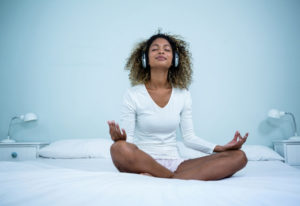If you are not getting a good night’s sleep these days, you are not alone. With the ongoing COVID-19 health crisis and the stress and anxiety that it brings, many people are experiencing difficulties falling and staying asleep. However, getting a good night of rest every night is essential to your overall mental health. With May being Mental Health Month, the focus on mental health combined with the anxiety of the global pandemic makes it the perfect time to make getting good sleep a priority in your life.
The Connection Between Sleep and Mental Health

While getting enough sleep at night will not magically cure mental illness, it can go a long way towards treating the condition so that it does not interfere with your quality of life in such a prevalent way. According to Harvard Health, sleep problems affect between 50 percent and 80 percent of people who report mental health issues. However, only 10 percent to 18 percent of people without mental illness report having difficulty falling and staying asleep. These numbers clearly demonstrate the close relationship between the two factors.
The Effects of Sleep Deprivation
There is no shortage of negative effects of sleep deprivation. In addition to the vast number of physical effects of not getting adequate sleep, this shortage can wreak havoc on your emotional and mental well-being. Here is just a snapshot of how a lack of sleep can negatively affect your mental health.
Depression
It is no surprise that insomnia boosts the risk of developing depression. The effects are worse in patients who begin contemplating suicide. Depressed patients that are able to sleep without disruption are less likely to report suicidal thoughts than those that are not getting enough rest at night.
Anxiety Disorders
Sleep deprivation has been shown to exacerbate the symptoms of many types of anxiety disorders. Some of the most commonly seen anxiety disorders that may be worsened as a result of lack of sleep include post-traumatic stress disorder (PTSD), obsessive-compulsive disorder and phobias.
ADHD
Attention deficit hyperactivity disorder (ADHD) is especially prevalent in children. Children with ADHD have issues with sleep at a rate of 25 – 50 percent, signaling that this is a significant issue with this group. Lack of sleep can make these children even more hyperactive and inattentive, compounding the symptoms of ADHD.
Mental Health Month
May has been the designated mental health month since 1949. This makes this month an ideal time to do a serious inventory of your mental health. The current global pandemic and the correlating feelings of self-isolation make it particularly important to pay careful attention to your emotional state so that you can effectively treat any issues.
The 2020 Mental Health Month theme is Tools 2 Thrive, offering you a host of materials designed to equip you with the information and resources that you need to improve your mental health. Special emphasis on the effects of the COVID-19 pandemic is included in this year’s toolkit.
Tips for Better Sleeping

Staying active, nourishing your body with healthy foods and avoiding alcohol just prior to bed will also help you to feel refreshed in the morning. Many people report seeing positive changes in their sleeping patterns by meditating prior to bedtime. Deep breathing exercises can relax the muscles and alleviate anxiety.
In addition, being intentional about creating an environment conducive to sleep will go a long way towards encouraging a restful night. This means keeping the temperature at a comfortably cool level, blocking out extraneous noise and keeping the room as dark as possible.
While many people are diligent about taking care of their physical health, it is not uncommon for mental and emotional health to be neglected in the process. You owe it to your overall health to nurture your mental health by being intentional about getting enough sleep each night.







